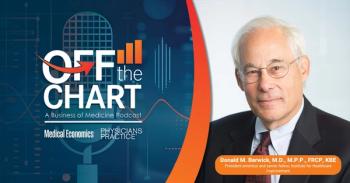
Healthcare Change: This Time, It's Real
Editorial director Bob Keaveney asks: Why can't healthcare be more like other industries?
In the 15 years I've been covering the healthcare business, one question has vexed me more than any other:
Why can't healthcare be more like other industries? Bankers figured out in the 1990s that leveraging information technology to allow people to see their own records and initiate transactions whenever they want just makes good sense, so they've deployed everything from ATMs to mobile apps to this purpose. Retailers have always understood that managing customer traffic efficiently is crucial to profit margins, so more of them are installing self-checkout machines.
Trucking companies know the value of fuel preservation and accident reduction, so most rigs now include satellite technology that tracks drivers' speed, lane changes, and hard brakes.
Healthcare, though, is stuck. The Institute of Medicine recently calculated that we waste some $750 billion a year on bloated bureaucracy, outright fraud, missed prevention opportunities, and needless tests and procedures. The only surprise is the size of the waste. I'm certainly not naïve to healthcare's inefficiencies, yet even I was struck by the number: $750 billion. Every year.
"That is roughly equivalent to the annual cost of health coverage for 150 million workers, or the budget of the Defense Department, or the 2008 bank bailout," noted The New York Times.
We've just about reached the point where healthcare's unsustainably high costs will actually be sustained no longer. America has major needs on virtually every other front, from education to infrastructure to our national debt, and Medicare's trust fund is scheduled to run out of money in 12 years. We really can't afford to continue wasting that much money, and we won't. The cuts in Medicare payments to healthcare providers called for in Obamacare - and those cuts are no bluff, they're law - are going to force providers (especially hospitals) to reduce costs or go broke.
What does it mean? Three things at least:
• Physicians have more power than they know, if they're willing to leverage it, and I think their power is increasing right now. I realize that's a strange thing to say. Yes, healthcare is becoming more institutionalized as hospitals seek to increase market share and drive economies of scale. But that means hospitals need your cooperation more than ever. They've always wanted your referrals but now they need you to be their partner. That's why so many of them, even as they acquire practices and try to hire more and more staff physicians, are fretting about how to create cohesive internal physician cultures. Are you considering hospital employment? Looking at selling your practice? Now's the time to leverage your power. Start by asking yourself: What do you want from your relationship with the hospital? And what are you willing to give?
• Information technology is going to change the way healthcare is managed in this country, mostly for the better. I understand that making changes in your work style, as any new technology requires, is a slow, painful, and frustrating task. And while I'm no apologist for the EHR companies, some of whom have created poorly designed products over the years, a paper system that misplaces charts and requires patients to carry them around from one provider to the next is indefensibly archaic. It's also over.
• The transition from our fee-for-service healthcare economy to one that pays for outcomes is underway, but the transition will be long, slow, and never entirely complete. You'll always get compensated for the services you perform (provided of course that the service is covered by the payer). Changing the economics of American healthcare is going to take many, many years. And you'll always be paid something for the services you perform; but a little more of your income each year will be tied to your ability to demonstrate that what you're doing is working.
Change is coming to healthcare, at long last. Physicians can't stop the change - not this time - but they can be a powerful force in shaping it. If they so choose.
Bob Keaveney is the editorial director of Physicians Practice. Tell him what you think at
This article originally appeared in the October 2012 issue of Physicians Practice.
Newsletter
Optimize your practice with the Physicians Practice newsletter, offering management pearls, leadership tips, and business strategies tailored for practice administrators and physicians of any specialty.






